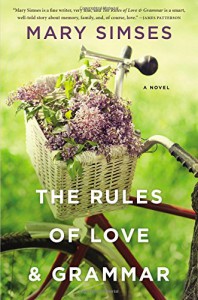
Book Review: The Rules of Love and Grammar

Book: The Rules of Love and Grammar
Author: Mary Simses
Genre: Fiction/Small Town/Romantic Comedy
Summary: Newly jobless, newly single, and suddenly apartmentless, writer Grace Hammond has come unmoored. A grammar whiz who's brilliant at correcting other people's errors, she hasn't yet found quite the right set of rules for fixing her own mistakes. Desperate to escape the city and her trifecta of problems, Grace hits pause and retreats to her Connecticut hometown. What begins as a short visit with her parents quickly becomes a far more meaningful stay, though, as she discovers that the answers to what her future holds might be found by making peace with - and even embracing - the past. As Grace sets out to change her ways and come to terms, finally, with the tragedy that took her older sister's life so many years ago, she rekindles a romance with her high school sweetheart, Peter, now a famous Hollywood director who's filming a movie in town. Sparks also fly at the local bike shop, where Grace's penchant for pointing out what's wrong rattles the owner's ruggedly handsome schoolteacher son, Mitch. Torn between the promise of a glamorous life and the allure of the familiar, Grace must decide what truly matters - and whether it's time for her to throw away the rule book and bravely follow her heart. -Little, Brown and Company, 2016.
With a lazy Saturday, it doesn't take much to finish a book - particularly a book like this one. The reason I classified this book as a romantic comedy is because it reads like one. In fact, I would be shocked if the movie for this book isn't already in the works. Now, just because I say "movie", doesn't mean it was necessarily a perfect read.
This book is like the antithesis of my previous read (The Book of Lost and Found). Where I loved the careful pacing of the former, Rules was so fast in pace, I think I got whiplash. The characters here are your small town romance archetypes - the clumsy, unaware-of-her-own-beauty heroine, the calm, always-there-for-you best friend, the archenemy who has the fake looks and is always popular - you know the ones. After realizing that, I knew exactly how this was going to go.
There is a love (?) triangle (of sorts). In fact, there was almost a love square, but I feel like Simses was told to cut down on the potential love interests. Because of that, the potential third beau's plot line is cut off and withered. A pity since it had the potential to be genuinely interesting.
I put the question mark earlier because, to put it plainly, readers are told of a romance. It's all up to Grace to tell the reader how Mitch and Peter are acting, but she tells you very little. The reader can see that she is obsessed with Peter; so much so you wonder how Peter put up with her. As someone attuned to second hand embarrassment, there were many, many moments in this book where I had to close the book and walk off my embarrassment for Grace because she was putting herself in situations that would horrify most people (see common romantic comedy tropes).
As for Mitch, you know it's supposed to be the love/hate relationship setup, but it's never shown where hate becomes love. You have to believe that it happens simply because you're told, and that's what's expected of the trope.
In fact, a lot of the plot itself is telling, not showing. Simses can certainly describe locations and people, but rarely does she allow relationships and situations to flow naturally without telling the reader anything.
There's also a tone problem with this book. While Grace runs around with her beaus, she's confronting the guilt she feels after the death of her older sister. While love troubles and unconfronted grief are not necessarily exclusive to each other, there is a way of going about it. The book's tone screams romantic comedy so much that when it comes time for the more somber moments, the tonal shift hasn't properly occurred. There are scenes where not even a whole paragraph before, Grace is waxing poetic about her love life, and then suddenly she's talking about her dead sister. The scenes aren't given time to breathe and settle - they seem rushed in order to get back to the romance shenanigans. In fact, to give minor spoilers, it's hard to reconcile that a woman who can have a fight with her father over being her sister's replacement for his expectations can also be the same woman who gets perfume sprayed on her by comically screeching fangirls. It's very, very odd.
So, for me, while the book is charming in its own way, it's a little too comedic and the pacing, for me, is way, way too fast. It feels rushed, so I couldn't really enjoy it. I felt like I was spun on a swing until I was cross-eyed, especially at the end. Conflicts are resolved so quickly, I almost did a double-take.
I give The Rules of Love & Grammar a C+.
~*~
Please support the author by buying the book or by borrowing it from a friend or your local library.
Thanks for reading!







